5 Preventable Mistakes New Hikers Always Make
Think going for a hike is just taking a walk outside? Not when you're headed into the wilderness it's not, though plenty of newbie hikers apparently think that way. According to a recent Brown University study, new hikers are frequently unprepared for the challenges of the trail (surprise, surprise). They get lost, they don't bring enough water, they wear inadequate shoes and, as you'd expect, they don't bring emergency gear.
To conduct the study, the author surveyed 199 hikers at three different trailheads in New Hampshire's White Mountain National Forest to find out what gear they were carrying, whether they'd checked the weather ahead of time and if they'd shared their hiking plans with friends or family. He gauged their readiness based on how many of 10 essential items (as determined by New Hampshire's HikeSafe program)—map, compass, warm clothing, extra food and water, flashlight, firestarter, first aid kit, whistle, rain clothing and a knife—each hiker carried as he or she headed into the woods. Only 40 percent were carrying at least eight of 10 items. The majority of unprepared hikers were young and/or inexperienced, and those planning for shorter hikes also tended to be less prepared.
But it doesn't take long for a short hike to take a turn for the worst. An injury in the backcountry, or a wrong turn without proper navigation instruments can make a day hike into an overnight ordeal. It's always important to be prepared (check out our preparedness primer for first-time hikers).
We spoke with Jonathan Martin, New Jersey program coordinator at the New York-New Jersey Trail Conference about common mistakes beginner hikers make, and how you can prevent them.
Getting Lost
When you're out in the woods and you lose the trail, every tree looks the same (trust us). Bring a map and compass—and take time to learn to use them—when you go hiking. Many people rely on GPS devices, or simply download PDF maps to their smartphone, but you should always supplement these with paper maps (the batteries will never run out).
If you do bring your phone (and why not, as long as it's powered down?), keep the local rangers' phone number saved as a contact. If you manage to reach a ranger, it can spare an all-out rescue effort. Martin says plenty of new hikers get lost on unfamiliar trails and, in fact, he gets phone calls from lost hikers almost every week. With identifying features of the trail, he can generally get them back on track in short order.
Getting Thirsty
Water should be your number one packing priority before a hike. An average person needs at least 64 ounces of water a day, which translates to even more water when you're exercising in summer's heat for hours at a time. Pack as much water as you can reasonably carry. A couple of water purification tablets are a good idea, too, since they can make any water potable and weigh next to nothing.
The puny water bottle you bring to the gym is likely too small for a rigorous hike. Martin says that skimping on water is a common problem among hikers. "Most people grab a 16-ounce Poland Spring bottle and hit the trail," he says.
Sore Feet
Martin says that footwear is an important consideration for new hikers. "I would suggest everyone go to their local outfitter and get something that fits like a glove," he says. For most people, that means something more substantial than a pair of road running or walking shoes, which aren't made for the rugged, uneven terrain of hiking trails. A sturdy, well-fitting pair of hiking boots or even trail shoes that are designed for off-roading can help minimize blisters, turned ankles and other foot problems. Just be sure to break in boots—even wearing them around the house—before taking on a substantial hike.
Getting Sunburned
The telltale blush of a sunburn is all too common among hikers, particularly those who spend long periods above treeline or otherwise out in the open. When you hit the trail, slather on the sunscreen (seriously—no one is too cool on a hike). Reapply every hour or so, especially when you're hiking at higher altitudes—the skin gets cooked quicker in the mountains. Don't forget SPF lip balm, either. You don't want to feel your cracked, sunburned lips when you're quaffing a post-hike beer. There's a reason most hiking guides list sunscreen as a top ten essential. (It's the beer reason, right?)
Getting Hurt
Bad things can—and occasionally do—happen on hikes. You can trip and fall. Someone in your party could twist an ankle. At some point, you're likely to wander into poison oak or ivy. What makes these situations different from any other time, is that you're on your own in the backcountry. For that reason, a fully-stocked first aid kit is essential. Include bandages, medical or electrical tape, disinfectant, over-the-counter allergy medication, ointments to treat poison ivy and other skin rashes, simple painkillers like ibuprofen and extra doses of prescription medications.
